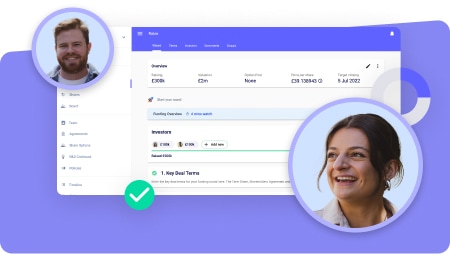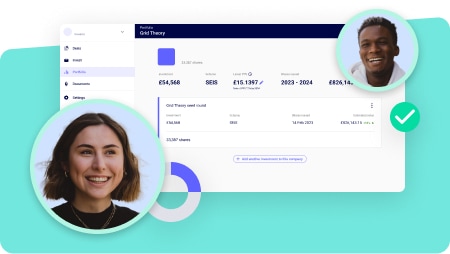Read transcript
Of all the startup challenges, finding a co-founder is one of the hardest. If you’re looking for a Java developer, you can post a job ad saying, “Wanted: Java developer with three years of experience, paying £40,000, £60,000, or £80,000,” and you’ll get responses. But for a co-founder, what do you advertise? “Wanted: someone to work for no money, lots of equity, potential big exit, must tolerate my temperament and late-night emails.” It’s not exactly scalable.
So, let’s start with the question: Do you need a co-founder? Then we’ll explore the ideal personality and how you can find one.
First, do you need a co-founder? At SeedLegals, our data shows that companies with two founders tend to raise investment faster and raise more than companies with one or more than three co-founders. We also see that when there are more than three co-founders, there’s often a founder fallout—too many cooks in the kitchen. It seems two founders are optimal. Sometimes three works, and of course, there are successful solo founders too. There’s nothing wrong with that.
Now, let’s look at the roles that need to be filled in a business and how they map to founders. To build a great, successful, growing company, you need three key roles.
First, you need the domain expert or “hustler.” This is usually the person whose idea it was—someone who knows the audience, has identified the opportunity, and is often the one on stage pitching. They understand what the audience wants and have the vision. But they often don’t know how to build the product.
The second role is someone who can help deliver that product, often the CTO or someone in a product role. In early-stage companies, this is usually a technical co-founder, who is rare to find. Without a technical co-founder, investors might hesitate because there could be a gap between the vision and the ability to execute it.
The third role is the person who handles the money—usually the CFO or COO. This person ensures the business is growing, generating revenue, paying bills, and doing the financial modeling that other founders might not enjoy.
So, look within and identify which of these roles you fill. Rarely does one person fit all three. More likely, you’ll match one, and your goal is to find a co-founder to complement your skills.
For example, in the case of SeedLegals, I’m the tech guy who loves presenting. My co-founder is more of a back-office, strategic person. We can both handle the financials, but I defer to him on that. This dynamic works well for us.
Once you’ve identified the roles and which one you fill, the question is: Where do you find a co-founder? I don’t have a definitive answer, but there is a good book (and I’m quoted in it, so it must be good). You can find it on CreatorCampus.io. It has great tips on finding a co-founder.
Since you can’t exactly advertise “Wanted: Co-founder for no money,” there are founder groups where you might find someone. You might not directly advertise for a co-founder but instead share what you’re working on. Posting on LinkedIn or Twitter about your company might attract interest. The more noise you make, the more responses you’ll get.
Finding a co-founder is a bit like dating. You don’t immediately look for a spouse—you go on dates first to see if it’s a good fit. In startups, the equivalent might be looking for a technical lead rather than a CTO right away. If you post “Wanted: CTO co-founder,” you might attract someone looking to manage a team when what you really need is a developer to build the product. A CTO might not be the right person at an early stage.
Instead, consider starting with a tech lead. Show them that there’s a path to becoming a co-founder and CTO. This gives you flexibility—if things don’t work out, you haven’t given away a large chunk of equity. You can pay them some money or give them a smaller equity share based on their senior tech role, and if things go well, it can grow into a co-founder position.
Networking is crucial. The more you network, the more likely you are to find the right co-founder.
One last thing—founder relationships often don’t work out. You might meet someone in a pub, go for a run together, and get excited about the idea. But then things don’t go as planned. Maybe one of you has a day job and can’t commit fully, or you can’t agree on the product direction. Our data suggests that in 10–20% of early-stage companies, there’s a founder fallout. When people come to us at SeedLegals saying, “I have a founder fallout, what should I do?” our first question is: Do you have a founder agreement in place? If yes, great—let’s review it. If not, it can be like a showdown at dawn.
A founder agreement is essential. It outlines what happens if a founder leaves—how they must return some of their shares to the company. You might create a founder agreement with a three-year vesting schedule, stating that if a founder leaves within the first three years, they must give back a portion of their shares. If things fall apart after three months, they return 90% of their shares, keeping a small portion for the work they did.
A common setup is a four-year vesting schedule with a one-year cliff. This means if a founder leaves within the first year, they get nothing. These vesting schedules are a double-edged sword: you don’t want to invest a year of your life and leave with nothing, but you also want protection if your co-founder leaves too soon.
The founder agreement should also include intellectual property (IP) assignments, ensuring that any IP developed belongs to the company. This is crucial when raising investment. Without it, you could face delays and complications during a funding round if a former co-founder doesn’t sign over their IP rights.
At SeedLegals, we offer founder agreements for free, along with non-disclosure agreements and other legal documents.
That was your 101 on finding a co-founder. If you want to know more, feel free to reach out to us at SeedLegals. We’re here to answer any questions. Thank you!
Of all the startup challenges, finding a co-founder is one of the hardest. If you’re looking for a Java developer, you can post a job ad saying, “Wanted: Java developer with three years of experience, paying £40,000, £60,000, or £80,000,” and you’ll get responses. But for a co-founder, what do you advertise? “Wanted: someone to work for no money, lots of equity, potential big exit, must tolerate my temperament and late-night emails.” It’s not exactly scalable.
So, let’s start with the question: Do you need a co-founder? Then we’ll explore the ideal personality and how you can find one.
First, do you need a co-founder? At SeedLegals, our data shows that companies with two founders tend to raise investment faster and raise more than companies with one or more than three co-founders. We also see that when there are more than three co-founders, there’s often a founder fallout—too many cooks in the kitchen. It seems two founders are optimal. Sometimes three works, and of course, there are successful solo founders too. There’s nothing wrong with that.
Now, let’s look at the roles that need to be filled in a business and how they map to founders. To build a great, successful, growing company, you need three key roles.
First, you need the domain expert or “hustler.” This is usually the person whose idea it was—someone who knows the audience, has identified the opportunity, and is often the one on stage pitching. They understand what the audience wants and have the vision. But they often don’t know how to build the product.
The second role is someone who can help deliver that product, often the CTO or someone in a product role. In early-stage companies, this is usually a technical co-founder, who is rare to find. Without a technical co-founder, investors might hesitate because there could be a gap between the vision and the ability to execute it.
The third role is the person who handles the money—usually the CFO or COO. This person ensures the business is growing, generating revenue, paying bills, and doing the financial modeling that other founders might not enjoy.
So, look within and identify which of these roles you fill. Rarely does one person fit all three. More likely, you’ll match one, and your goal is to find a co-founder to complement your skills.
For example, in the case of SeedLegals, I’m the tech guy who loves presenting. My co-founder is more of a back-office, strategic person. We can both handle the financials, but I defer to him on that. This dynamic works well for us.
Once you’ve identified the roles and which one you fill, the question is: Where do you find a co-founder? I don’t have a definitive answer, but there is a good book (and I’m quoted in it, so it must be good). You can find it on CreatorCampus.io. It has great tips on finding a co-founder.
Since you can’t exactly advertise “Wanted: Co-founder for no money,” there are founder groups where you might find someone. You might not directly advertise for a co-founder but instead share what you’re working on. Posting on LinkedIn or Twitter about your company might attract interest. The more noise you make, the more responses you’ll get.
Finding a co-founder is a bit like dating. You don’t immediately look for a spouse—you go on dates first to see if it’s a good fit. In startups, the equivalent might be looking for a technical lead rather than a CTO right away. If you post “Wanted: CTO co-founder,” you might attract someone looking to manage a team when what you really need is a developer to build the product. A CTO might not be the right person at an early stage.
Instead, consider starting with a tech lead. Show them that there’s a path to becoming a co-founder and CTO. This gives you flexibility—if things don’t work out, you haven’t given away a large chunk of equity. You can pay them some money or give them a smaller equity share based on their senior tech role, and if things go well, it can grow into a co-founder position.
Networking is crucial. The more you network, the more likely you are to find the right co-founder.
One last thing—founder relationships often don’t work out. You might meet someone in a pub, go for a run together, and get excited about the idea. But then things don’t go as planned. Maybe one of you has a day job and can’t commit fully, or you can’t agree on the product direction. Our data suggests that in 10–20% of early-stage companies, there’s a founder fallout. When people come to us at SeedLegals saying, “I have a founder fallout, what should I do?” our first question is: Do you have a founder agreement in place? If yes, great—let’s review it. If not, it can be like a showdown at dawn.
A founder agreement is essential. It outlines what happens if a founder leaves—how they must return some of their shares to the company. You might create a founder agreement with a three-year vesting schedule, stating that if a founder leaves within the first three years, they must give back a portion of their shares. If things fall apart after three months, they return 90% of their shares, keeping a small portion for the work they did.
A common setup is a four-year vesting schedule with a one-year cliff. This means if a founder leaves within the first year, they get nothing. These vesting schedules are a double-edged sword: you don’t want to invest a year of your life and leave with nothing, but you also want protection if your co-founder leaves too soon.
The founder agreement should also include intellectual property (IP) assignments, ensuring that any IP developed belongs to the company. This is crucial when raising investment. Without it, you could face delays and complications during a funding round if a former co-founder doesn’t sign over their IP rights.
At SeedLegals, we offer founder agreements for free, along with non-disclosure agreements and other legal documents.
That was your 101 on finding a co-founder. If you want to know more, feel free to reach out to us at SeedLegals. We’re here to answer any questions. Thank you!
This transcript was generated using AI technology. While it may not be an exact word-for-word representation, it’s accurate to the overall meaning and intent of the conversation.
Of all the startup challenges, finding a co-founder is one of the hardest… SeedLegals CEO and serial founder Anthony Rose breaks down how to do it, how to know what you need and the mistakes to avoid.
Watch video
Free ebook: Find co-founders and build your team
Free downloadKey takeaways
Finding a co-founder is tough: it’s not like hiring a Java developer. You can’t just advertise for “someone willing to work for no pay, tolerate my quirks, and cross their fingers for a big payout.”
Do you even need one? Two founders seem to hit the sweet spot. Companies with two founders raise faster and get more money than those with one or more than three. Three works, but more than that? Too many cooks.
Three key roles you need:
- The Hustler: the visionary, the one who’s got the big idea and can sell it
- The Builder: the tech genius who can actually make it happen (CTO type)
- The Money Person: the CFO/COO who’s all about revenue and keeping the lights on
Know yourself: figure out which role you fit into. Chances are, you can’t do all three. Then go find someone to fill the gaps.
Where to find a co-founder? There’s no magic answer, but networking, posting about your startup on LinkedIn/Twitter, and founder groups are good bets. Also, there’s a good book about it (and yes, I’m quoted in it) and it’s completely free. Find it at Playbook: Find Co-Founders and Build Your Team
Co-founder = marriage: you don’t jump straight into marriage. Start with a movie date (ie maybe look for a tech lead before throwing around the CTO/co-founder title).
Be careful with equity: don’t hand over half your company on the first date. Let them earn that co-founder role over time.
Founder fallouts happen: it’s common. 10–20% of the time, early-stage startups have a founder fallout. So be prepared.
Founder agreement = must-have: protect yourself. Set up a vesting schedule so if someone leaves early, they don’t walk away with a huge chunk of equity. Oh, and make sure IP stays with the company.
SeedLegals has you covered: you can sort your founder agreements, IP assignments, and more – with expert help at every step.
Essential startup contracts
Create legal contracts in minutes
Founder agreements, team agreements, NDAs and IP assignments - get all the contracts you need to protect your business as part of your SeedLegals membership.
Start free
















